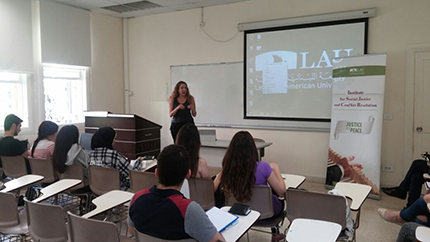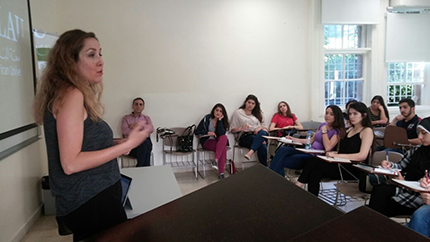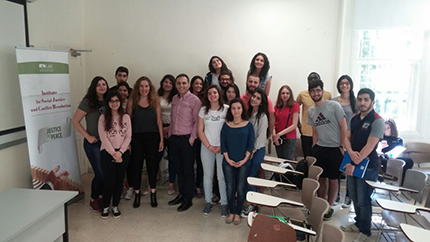Discussion with Dr. Carmen Geha: Comparing Transition and Constraints from the Perspective of Civil Society Movements
Beirut, April 19, 2016. AUB Assistant Professor of Public Administration Dr. Carmen Geha discussed civil society movements in Libya and Lebanon during a special guest speaking presentation hosted by the Institute for Social Justice and Conflict Resolution at the Lebanese American University.

Institute’s director Dr. Imad Salamey and International Affairs student Rayan Dib introduced Dr. Geha and highlighted her background as an activist and scholar. Then, Dr. Geha presented her research work and her latest book publication Civil Society and Political Reform in Lebanon and Libya: Transition and constraint that examined the failure and success of civil society movements in driving political reforms in Lebanon and Libya.
According to Geha, similarities between both countries have driven her comparative research. First, both countries are struggling with power sharing and consensus politics. Second, both have weak state institutions. “[The state] is not a guarantor of citizenship and equal rights”, she noted. Third, even though numerous NGOs operate in both countries, their effectiveness in the political realm is quite limited.

When explaining how civil society movements induce transition and change, Dr. Geha pointed out that “during critical historic junctures opening opportunities through mass action increase the possibilities for change”.
Dr. Geha’s study reveals civil society is in dire need to reassess strategic intervention that insinuate political reforms, most critically is to expand its reach to groups beyond the educated middle class. Forging a wider and more effective and enduring alliances. This includes building coalitions during non-critical times as opposed to just reacting to events.
Dr. Geha emphasized the central role the youth can play to energize social movements and in injecting new ideas for change. Striking the balance between realist and utopian’s attainment for political change may produce success. Professor Geha speaking was concluded by a lively interaction with the audience.

Audience Responses: Comparing Transition and Constraints from the Perspective of Civil Society Movements
Today’s presentation and Q&A by Dr. Carmen Geha was very interesting and insightful. She made a comparative analysis about the social movements in Libya and Lebanon. Her main topic of research was why the civil society is not successful in political processes when trying to make a change, especially during transitional times, in these two countries. I was made aware of the three main attributes between Lebanon and Libya that are similar. First the power-sharing system in both countries, that leaves out the civil society from political processes and overall the negative aspects of such a system with respect to the civil society. Second, both countries display weak institutions and states that do not push for change during critical times and lastly, the social movements in both countries were dynamic. What i found interesting was the fact that activists should not only take action during critical times, but also during non-critical times. What I also found notable was the fact that social movements should seek alliance to build a stronger case, not necessarily from political parties, but from religious groups or private corporations which are relevant to the case at hand. An interesting question was made about the “You Stink” movement, and about whether or not its lack of success and inability to bring a change in the end result was due to the fact that it wasn’t initiated at a critical moment. The speaker said that this issue and social movement is a protracted one, and that is why it was hard to unite and reach success, especially when the activists are not experienced. The talk was overall very interesting, the Q&A was also insightful and the speaker was very responsive and helpful.
The guest speaker was Dr. Carmen Geha who presented a comparative study on the civil society movements in Libya and Lebanon. Dr. Geha was a brilliant speaker and the topic was the most interesting to me so far. She made me aware that effective civil society movements take place during certain junctures, which are the appropriate time for action. It was particularly interesting to me that weak states which allow room for external controlling groups promote an ineffective civil society. Several interesting questions were asked, like why she chose to compare Libya, and not another country, to Lebanon. I also asked her some questions, such as whether an ineffective state could be the explanation behind the futility of the You Stink movement. I find social movements in general to be an interesting topic and I would like us to explore in depth this issue in the future.
Today’s speaker was very interesting because she talked about similarities between Libya and Lebanon. Her research is based on surveys and interviews in Libya which is interesting because Libya is a country that was far from the media lights and its population could not speak. So through her interviews she gave Libyan an opportunity to express their opinion. One thing that really caught my attention is that she says that even though the Arab spring occurred, things have not changed a lot and we go back to the same cycle; if things are made in a way it is really hard to change them (to go from authoritarian regime to democracies). This idea was really interesting because in Lebanon and in the Arab World this is what happening today.
Assistant Professor Carmen Geha was not only so knowledgeable about the topic of social movements but also capable of explaining her topic so clearly. The order by which she presented the comparison between Libya and Lebanon was logical and interesting. Her experience as an activist for 10 years was also vivid. Subtitles included the influence of social movements during transitions, their challenges, disappointments, the importance of critical junctures, path dependent theory… Everything she talked about was close to what we have learned. We could easily follow up and engage with her and this was clear by the Q/As that were exchanged. Another interesting topic was the similar features between Lebanon and Libya: power sharing system, weak state institutions, and civil society organizations. What caught my attention the most was the question of why it is hard to induce change in Lebanon. Reasons are: coexistence, political leaders, and Nizam Taifi. The discussion was so interesting and tangible more than simply theoretical. Personally, I would be interested in attending more of Geha’s lectures. She is so knowledgeable and can tell a lot about social movements in a very logical and practical manner.
I enjoyed Dr Geha’s lecture and thought that the subject of focus was extremely interesting. A comparison between Libya and Lebanon in terms of the systems in place allowed for similarities to be recognized. Both Libya and Lebanon have power-sharing systems, Libya is currently transitioning into one with the incorporation of representation. Power-shared systems inevitably lead to confinement and a change in policy, laws and decisions requires consensus. They both have weak institutions, and political leaders or power brokers that are of great importance. I liked how the Doctor spoke of NGO’S and their vital role in civil society. According to studies there are about 9,000 NGO’S in Lebanon and 3,000 organizations in Libya. But hardly any of these organizations deal with political reform processes, some do but there are not enough who capable of aiding political change. Another comment made during the lecture was that activists should make use of non-critical times to strategize. Which I think, is key to developing strategies of action, and also important for gathering support. The studies conducted in Libya were new to me, and the lecturer’s analysis was unique in the sense of an on the ground comprehensive study
(In libya). One of the studies conducted was a question that I asked at the end of the class. The question that I asked was about the demands of the Libyan youth, and the answer involved four concepts. When the lecturer was conducting her studies, she found that most Libyan youth wanted rotation over power, economic activity , new laws of association and a plan for public morality.
Dr. Carmen Geha worked with a transparency group in order to monitor elections and see why people start off enthusiastic and big then lose that in the end. She stated that the Arab spring allows political change to occur and is an important critical juncture. Geha also adds that the mass population wants change but politicians stop it. She names 3 attributes that left out civil society from political action: Power sharing which is a form of democracy that leads to confinement, weak state institutions meaning the state is not the protector of the citizens to the extent that there are other militias that don’t belong to the state itself, and civil society organizations that were dynamics; Geha includes a comparison between Lebanon and Libya where she says that in 2 years 3000 NGO’s appeared in Libya that were working on different issues, where as in Lebanon there are 9000 NGO’s, stating that in both countries all NGOs are ineffective. In her presentation, she introduces the reasons for the lack of critical change in Lebanon. First comes the concept of co-existence, then comes the problem of ‘zoaama’ powerful leaders that are not necessarily in a formal position, and lastly sectarianism in Lebanon and regionalism in Libya.
It was a very interesting presentation full of comparison that relates to our course, but precisely due to the fact that she was able to track down bribery in Lebanon.
It was an honor to have such a competent and knowledgeable guest speaker, Dr. Carmen Geha, who showed impressive passion about the subject. She managed to make it a very engaging and interesting discussion and answered the questions of my fellow classmates with the utmost professionalism and insight concerning the issue of social movements. Dr. Geha, after having been an activist for 10 years, realized that the efforts of the social movements often yielded no substantial change. Seeing this, she dug deep behind the reason as to why social movements have become disappointing. According to her findings, the possibility for change or ‘reform’ is characterized by a strong external force or shock. That is, a moment of political change results from a critical change at the level of the state itself. From her findings, Dr. Geha found three common attributes between Lebanon and Libya which included;
1- The power sharing system, which is characterized by establishing an agreement between conflicting parties that often leads to confinement and deadlock
2- Weak state institutions, which is manifested by the state not being the only holder of armed forces.
3- The large range of organizations that rarely lead to political change
As a political science/international affairs student, I was interested in the third attribute the most. I asked Dr. Geha the reason behind the fact that, despite having many NGOs in Lebanon, only a handful of them actually make a difference in the political domain. According to her, political reform has a higher chance of occurring when there is a strong external factor that influences the state. However, she encouraged us, as the youth, to engage in the political sector, because it might make a difference on the long run.
Dr. Carmen Geha led both an informative and engaging discussion which was completely relevant to the chapter we were taking with Dr. Imad Salamey, which is the chapter on Social Movements. She gave us a more practical approach than that of the book, since she actually presented us with quantitative data that she both collected and processed during her study. It was quite the privilege to be part of the discussion since she displayed a great deal of interest and passion about the subject. She spoke so freely and confidently about the subject and it was quite hard not to listen to the discussion or even get involved and ask questions. Thank you for the great opportunity, Dr. Salamey, it was truly an honor to have Dr. Geha.
Carmen Geha is a civil society activist who has contributed to founding a number of leading NGOs and campaigns on issues of electoral systems, access to information, and anti-sectarianism. Civil society and social movements are very good in providing services at a local level and raising awareness but when it comes to politics it seems not to be influential particularly during transitions. She wanted to understand first at the intuitive level what is making young people disappointed and second what explains those challenges trying to make this change. So, she decided to work on two cases for particular type of civil society organizations such as FDL and LADI which are those working on political change so she worked on election case study in Lebanon and worked on the constitutional development case study in Libya where organizations have been using dialogue, raising awareness, using training and trying to influence apolitical power and she says she uses the world political because she wants to differentiate so we are not disappointed at the global level. There are many organizations not perhaps even political reformed where she gave an example of response to Syrian refugees in Lebanon which has been highly dependent on the existence of civil society organizations so this doesn’t mean that such organizations in the Arab world are disappointing but in political functions its disappointing. It started former in a very intuitive manner where she wanted to know why people were first very enthusiastic and weren’t able to effect the change so she had to come up with a framework and chose to work with the critical junctions and its very helpful if we want to look at comparative cases of social movements and political opportunity. There are critical junctions in a political system where there are moments where there is an increased possibility of change. I was very interested by what she said about critical junctions being able to lead to a change where she said any external sock being able to create a critical moment can be considered as a moment of history where political change can occur. What was happening in both cases she was studying is that these critical moments led to a small change because of path dependent theory. She said there are three similar features between Lebanon and Libya: First, the power sharing system which leaves out civil society. Second, both countries have weak state institutions where state can’t push for change because political actors are outside the state. Third, civil society organizations are many but far from political reform which is means is ineffective in politics. In addition, she also mentioned that Lebanon has no change because of three intricacies: coexistence, political leaders and the system (Nizam taaifi). They wanted to discuss freedoms, resources, and governance systems. Libya started to exhibit prolonged deadlock which means division over which government and which parliament and what constituent assembly they want to have. Thus, in 2013 there was a government split because they couldn’t agree on who is going to write the formation of this constitution where some people wanted elections while others wanted appointment. She concludes that we have to look at these intricacies in these countries coming from the system where we need to know what coexistence is and what regional conflict is so we have to think of the role of Loading…Organizations and social movement. She was recommended to conclude her book with three things: First, this issue of critical junction ad revolution is very important but we also need to know the issue of timing that activists should use. The second criticism was the issue of building alliances where they succeed at a certain time but don’t succeed in building alliances to support their causes. The third issue that came out waste issue of strategy where in both countries the advocates were saying that this advocacy approach doesn’t work because the state isn’t structuring public participation when we advocate for something we look at it like who is deciding that issue.
Our guest speaker on Tuesday was Carmen Geha who mostly compared social movements in Libya and Lebanon. she stressed mainly on why before 2011 why were social movements unable to achieve change. after the Arab spring she went to Libya and right after the liberation of Benghazi and Tripoli. she surveyed talked and interviewed the people who were living there. by the time she left the people already have become disappointed by the result. she also worked on electoral reform. she said that both countries display weak state institutions. state does not protect the citizens and are not a guarantor of equal citizenship. we also talked and discussed about the you stink movement if it failed or succeeded. it was a very interesting topic that we discussed with Carmen Geha and it was more of a debate that turned the presentation more interesting. now i have more clear ideas how and why social movements fail or are successful and also what are their main purposes. i would like to see Carmen Geha visiting us again and share her experiences even more that shed had encountered in Libya.